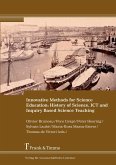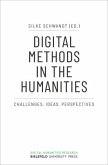Sharlene Nagy Hesse-Biber, R. Burke Johnson
The Oxford Handbook of Multimethod and Mixed Methods Research Inquiry
Sharlene Nagy Hesse-Biber, R. Burke Johnson
The Oxford Handbook of Multimethod and Mixed Methods Research Inquiry
- Gebundenes Buch
- Merkliste
- Auf die Merkliste
- Bewerten Bewerten
- Teilen
- Produkt teilen
- Produkterinnerung
- Produkterinnerung
Offering a variety of innovative methods and tools, The Oxford Handbook of Multi- and Mixed-Methods Research Inquiry provides the most comprehensive and up-to-date presentation on multi- and mixed-methods research available. Written in clear and concise language by leading scholars in the field, it enhances and disrupts traditional ways of asking and addressing complex research questions. Topics include an overview of theory, paradigms, and scientific inquiry; a guide to conducting a multi- and mixed-methods research study from start to finish; current uses of multi- and mixed-methods research…mehr
Andere Kunden interessierten sich auch für
![Innovative Methods for Science Education: History of Science, ICT and Inquiry Based Science Teaching Innovative Methods for Science Education: History of Science, ICT and Inquiry Based Science Teaching]() Innovative Methods for Science Education: History of Science, ICT and Inquiry Based Science Teaching49,80 €
Innovative Methods for Science Education: History of Science, ICT and Inquiry Based Science Teaching49,80 €![The Oxford Handbook of Philosophy and Literature The Oxford Handbook of Philosophy and Literature]() The Oxford Handbook of Philosophy and Literature70,99 €
The Oxford Handbook of Philosophy and Literature70,99 €![Oxford Handbook of Christian Monasticism Oxford Handbook of Christian Monasticism]() Bernice M KaczynskiOxford Handbook of Christian Monasticism188,99 €
Bernice M KaczynskiOxford Handbook of Christian Monasticism188,99 €![Digital Methods in the Humanities Digital Methods in the Humanities]() Digital Methods in the Humanities31,99 €
Digital Methods in the Humanities31,99 €![Sermons Preached Before the University of Oxford Between A.D. 1859 and 1872 Sermons Preached Before the University of Oxford Between A.D. 1859 and 1872]() Edward Bouverie PuseySermons Preached Before the University of Oxford Between A.D. 1859 and 187234,90 €
Edward Bouverie PuseySermons Preached Before the University of Oxford Between A.D. 1859 and 187234,90 €![The life and times of Anthony Wood, antiquary, of Oxford 1623-1695 The life and times of Anthony Wood, antiquary, of Oxford 1623-1695]() Anthony WoodThe life and times of Anthony Wood, antiquary, of Oxford 1623-169536,90 €
Anthony WoodThe life and times of Anthony Wood, antiquary, of Oxford 1623-169536,90 €![The Art of England : Lectures given in Oxford The Art of England : Lectures given in Oxford]() John RuskinThe Art of England : Lectures given in Oxford25,90 €
John RuskinThe Art of England : Lectures given in Oxford25,90 €-
-
-
Offering a variety of innovative methods and tools, The Oxford Handbook of Multi- and Mixed-Methods Research Inquiry provides the most comprehensive and up-to-date presentation on multi- and mixed-methods research available. Written in clear and concise language by leading scholars in the field, it enhances and disrupts traditional ways of asking and addressing complex research questions. Topics include an overview of theory, paradigms, and scientific
inquiry; a guide to conducting a multi- and mixed-methods research study from start to finish; current uses of multi- and mixed-methods research across academic disciplines and research fields; the latest technologies and how they can be incorporated into study design; and a presentation of multiple perspectives on
the key remaining debates.
Each chapter in the volume is structured to include state-of-the-art research examples that cross a range of disciplines and interdisciplinary research settings. In addition, the Handbook offers multiple quantitative and qualitative theoretical and interdisciplinary visions and praxis. Researchers, faculty, graduate students, and policy makers will appreciate the exceptional, timely, and critical coverage in this Handbook, which deftly addresses the interdisciplinary and
complex questions that a diverse set of research communities are facing today.
inquiry; a guide to conducting a multi- and mixed-methods research study from start to finish; current uses of multi- and mixed-methods research across academic disciplines and research fields; the latest technologies and how they can be incorporated into study design; and a presentation of multiple perspectives on
the key remaining debates.
Each chapter in the volume is structured to include state-of-the-art research examples that cross a range of disciplines and interdisciplinary research settings. In addition, the Handbook offers multiple quantitative and qualitative theoretical and interdisciplinary visions and praxis. Researchers, faculty, graduate students, and policy makers will appreciate the exceptional, timely, and critical coverage in this Handbook, which deftly addresses the interdisciplinary and
complex questions that a diverse set of research communities are facing today.
Produktdetails
- Produktdetails
- Oxford Library of Psychology
- Verlag: OUP USA / Oxford University Press
- Seitenzahl: 772
- Erscheinungstermin: 30. Juni 2016
- Englisch
- Abmessung: 260mm x 183mm x 46mm
- Gewicht: 1420g
- ISBN-13: 9780199933624
- ISBN-10: 0199933626
- Artikelnr.: 42362724
- Herstellerkennzeichnung
- Libri GmbH
- Europaallee 1
- 36244 Bad Hersfeld
- gpsr@libri.de
- Oxford Library of Psychology
- Verlag: OUP USA / Oxford University Press
- Seitenzahl: 772
- Erscheinungstermin: 30. Juni 2016
- Englisch
- Abmessung: 260mm x 183mm x 46mm
- Gewicht: 1420g
- ISBN-13: 9780199933624
- ISBN-10: 0199933626
- Artikelnr.: 42362724
- Herstellerkennzeichnung
- Libri GmbH
- Europaallee 1
- 36244 Bad Hersfeld
- gpsr@libri.de
Sharlene Janice Nagy Hesse-Biber is Professor of Sociology and the Director of the Women's and Gender Studies Program at Boston College in Chestnut Hill, Massachusetts. She has published widely in the field of mixed-methods research and on the impact of sociocultural factors on women's body image. Author of Mixed-Methods Research: Merging Theory with Practice (Guilford Publications, 2010) and associate editor of the Journal of Mixed-Methods Research, she is also on the editorial boards of Qualitative Health Research and Sociological Methodology. She is a co-developer of the software program HyperRESEARCH, a computer-assisted program for analyzing qualitative and mixed-methods data, and the transcription tool HyperTRANSCRIBE. R. Burke Johnson is Professor in the Department of Professional Studies at the University of South Alabama and is an interdisciplinarian with four graduate degrees, specializing in research methodology and philosophy of social science. He is coauthor or coeditor of six books, including two research methods textbooks: Educational Research: Quantitative, Qualitative, and Mixed Approaches (with Larry Christensen, 2014) and Research Methods, Design, and Analysis (with Larry Christensen and Lisa Turner, 2014).
* Preface
* Introduction: Navigating a Turbulent Research Landscape: Working the
Boundaries, Tensions, Diversity, and Contradictions of Multi- and
Mixed-Methods Inquiry
* Sharlene Nagy Hesse-Biber
* Part I: Linking Theory and Method in Multi- and Mixed-Methods
Research
* Chapter 1: Qualitatively Driven Approaches to Multi- and
Mixed-Methods Research
* Sharlene Nagy Hesse-Biber, Deborah Rodriguez, and Nollaig A. Frost
* Chapter 2: Quantitatively Driven Approaches to Multi- and
Mixed-Methods Research
* Melvin M. Mark
* Chapter 3: Thinking Outside the "Q" Boxes: Further Motivating a Mixed
Research Perspective
* Lisa D. Pearce
* Chapter 4: Revisiting Mixed Methods and Advancing Scientific
Practices
* John W. Creswell
* Chapter 5: Feminist Approaches to Multi- and Mixed-Methods Research:
Theory and Praxis
* Sharlene Nagy Hesse-Biber and Amy J. Griffin
* Chapter 6: Transformative and Indigenous Frameworks for Mixed- and
Multi-Method Research
* Fiona Cram and Donna M. Mertens
* Chapter 7: Understanding and Emphasizing Difference and
Intersectionality in Mixed- and Multi-method Research
* Olena Hankivsky and Daniel Grace
* Chapter 8: Interdisciplinary and Transdisciplinary MMR
* Rick Szostak
* Chapter 9: Putting Ethics on the Mixed-Methods Map
* Judith Preissle, Rebecca M. Glover-Kudon, Elizabeth A. Rohan,
Jennifer E. Boehm, Amy DeGroff
* Part II: Conducting Exploratory, Confirmatory, and Interactive MMR
* Chapter 10: Conducting Mixed-Methods Literature Reviews: Synthesizing
the Evidence Needed to Develop and Implement Complex Social and
Health Interventions
* Jennifer Leeman, Corrine I. Voils, and Margarete Sandelowski
* Chapter 11: Designing Multi-method Research
* Albert Hunter and John Brewer
* Chapter 12: Issues in Qualitatively Driven Mixed-Method Designs:
Walking through a Mixed-Method Project
* Janice M. Morse
* Chapter 13: Designing Integration in Mixed- and Multi-Method Research
* Joseph Maxwell, Margaret Chmiel, Sylvia E. Rogers
* Chapter 14: Validity in Mixed- and Multi-Method Research
* Kathleen M. T. Collins
* Chapter 15: Data Analysis I: Overview of Data-Analysis Strategies
* Julia Brannen and Rebecca O'Connell
* Chapter 16: Advanced Mixed Analysis Approaches
* Anthony J. Onwuegbuzie and John H. Hitchcock
* Chapter 17: Writing Up Mixed- and Multi-Methods Research for Diverse
Audiences
* Pat Bazeley
* Chapter 18: Funding for Mixed-Methods Research: Sources and
Strategies
* Jennifer P. Wisdom and Michael D. Fetters
* Chapter 19: Mentoring the Next Generation in Mixed Research
* Rebecca K. Frels, Isadore Newman, and Carole Newman
* Part III: Contextualizing MMR within and across Disciplines and
Applied Settings
* Chapter 20:Mixed- and Multi-Method Research in the Fields of
Education and Anthropology
* Jori N. Hall and Judith Preissle
* Chapter 21: Evolving Mixed- and Multi-Method Approaches for
Psychology
* Nollaig A. Frost and Rachel L. Shaw
* Chapter 22: Participatory Mixed-Methods Research (PMMR)
* Bradley D. Olson and Leonard A. Jason
* Chapter 23: Moving from Randomised Controlled Trials to Mixed-Methods
Intervention Evaluations
* Sarah J. Drabble and Alicia O'Cathain
* Chapter 24: Mixed-Methods Evaluation
* Donna M. Mertens and Michele Tarsilla
* Chapter 25: Applying Multiple and Mixed Methods to Prevention
Research in Global Health
* Stevan Weine
* Chapter 26: History and Emergent Practices of Mixed and Multiple
Methods in Business Research
* José F. Molina-Azorín and Roslyn A. Cameron
* Chapter 27: How Does Mixed-Methods Research Add Value to Our
Understanding of Development?
* Nicola A. Jones, Paola Pereznieto, and Elizabeth Presler-Marshall
* Part IV: Incorporating New Technologies into Mixed- and Multi-Method
Research
* Chapter 28: Mixed-Methods and Multimodal Research and Internet
Technologies
* Christine M. Hine
* Chapter 29: Conducting Mixed- and Multi-Method Research Online
* Janet E. Salmons
* Chapter 30: Emergent Technologies in Mixed- and Multi-Method
Research: Incorporating Mobile Technologies
* Leo Remijn, Nathalie Stembert, Ingrid Mulder, and Sunil Choenni
* Chapter 31: Emergent Technologies in Mixed- and Multi-Method
Research: Incorporating GIS and CAQDAS
* Jane L. Fielding and Nigel G. Fielding
* Part V: Commentaries: Dialoguing about Future Directions of Mixed-
and Multi-Method Research
* Chapter 32: What Problem Are We Trying to Solve? Practical and
Innovative Uses of MMR
* Thomas A. Schwandt and Lauren Lichty
* Chapter 33: Mixed Methods and the Problems of Theory Building and
Theory Testing in the Social Sciences
* Udo Kelle
* Chapter 34: Preserving Distinctions within the MMR Merger
* Jennifer C. Greene
* Chapter 35: Conundrums on Multimethod Research
* Albert Hunter and John Brewer
* Chapter 36: It Depends: Possible Impacts of Moving the Field of
Mixed-Methods Research Towards Best Practice Guidelines
* Julianne Cheek
* Chapter 37: Feminism, Causation, and Mixed-Methods Research
* Sharon Crasnow
* Chapter 38: Causality, Generalizability, and the Future of
Mixed-Methods Research
* Robert K. Yin
* Chapter 39: Mixed Methods: Dissonance and Values in Research with
Marginalized Groups
* Dawn Freshwater and Pamela Fisher
* Chapter 40: Harnessing Global Social Justice and Social Change with
Multiple- and Mixed-Method Research
* Fiona Cram
* Conclusions: Toward an Inclusive and Defensible Multi- and Mixed
Science
* R. Burke Johnson
* Index
* Introduction: Navigating a Turbulent Research Landscape: Working the
Boundaries, Tensions, Diversity, and Contradictions of Multi- and
Mixed-Methods Inquiry
* Sharlene Nagy Hesse-Biber
* Part I: Linking Theory and Method in Multi- and Mixed-Methods
Research
* Chapter 1: Qualitatively Driven Approaches to Multi- and
Mixed-Methods Research
* Sharlene Nagy Hesse-Biber, Deborah Rodriguez, and Nollaig A. Frost
* Chapter 2: Quantitatively Driven Approaches to Multi- and
Mixed-Methods Research
* Melvin M. Mark
* Chapter 3: Thinking Outside the "Q" Boxes: Further Motivating a Mixed
Research Perspective
* Lisa D. Pearce
* Chapter 4: Revisiting Mixed Methods and Advancing Scientific
Practices
* John W. Creswell
* Chapter 5: Feminist Approaches to Multi- and Mixed-Methods Research:
Theory and Praxis
* Sharlene Nagy Hesse-Biber and Amy J. Griffin
* Chapter 6: Transformative and Indigenous Frameworks for Mixed- and
Multi-Method Research
* Fiona Cram and Donna M. Mertens
* Chapter 7: Understanding and Emphasizing Difference and
Intersectionality in Mixed- and Multi-method Research
* Olena Hankivsky and Daniel Grace
* Chapter 8: Interdisciplinary and Transdisciplinary MMR
* Rick Szostak
* Chapter 9: Putting Ethics on the Mixed-Methods Map
* Judith Preissle, Rebecca M. Glover-Kudon, Elizabeth A. Rohan,
Jennifer E. Boehm, Amy DeGroff
* Part II: Conducting Exploratory, Confirmatory, and Interactive MMR
* Chapter 10: Conducting Mixed-Methods Literature Reviews: Synthesizing
the Evidence Needed to Develop and Implement Complex Social and
Health Interventions
* Jennifer Leeman, Corrine I. Voils, and Margarete Sandelowski
* Chapter 11: Designing Multi-method Research
* Albert Hunter and John Brewer
* Chapter 12: Issues in Qualitatively Driven Mixed-Method Designs:
Walking through a Mixed-Method Project
* Janice M. Morse
* Chapter 13: Designing Integration in Mixed- and Multi-Method Research
* Joseph Maxwell, Margaret Chmiel, Sylvia E. Rogers
* Chapter 14: Validity in Mixed- and Multi-Method Research
* Kathleen M. T. Collins
* Chapter 15: Data Analysis I: Overview of Data-Analysis Strategies
* Julia Brannen and Rebecca O'Connell
* Chapter 16: Advanced Mixed Analysis Approaches
* Anthony J. Onwuegbuzie and John H. Hitchcock
* Chapter 17: Writing Up Mixed- and Multi-Methods Research for Diverse
Audiences
* Pat Bazeley
* Chapter 18: Funding for Mixed-Methods Research: Sources and
Strategies
* Jennifer P. Wisdom and Michael D. Fetters
* Chapter 19: Mentoring the Next Generation in Mixed Research
* Rebecca K. Frels, Isadore Newman, and Carole Newman
* Part III: Contextualizing MMR within and across Disciplines and
Applied Settings
* Chapter 20:Mixed- and Multi-Method Research in the Fields of
Education and Anthropology
* Jori N. Hall and Judith Preissle
* Chapter 21: Evolving Mixed- and Multi-Method Approaches for
Psychology
* Nollaig A. Frost and Rachel L. Shaw
* Chapter 22: Participatory Mixed-Methods Research (PMMR)
* Bradley D. Olson and Leonard A. Jason
* Chapter 23: Moving from Randomised Controlled Trials to Mixed-Methods
Intervention Evaluations
* Sarah J. Drabble and Alicia O'Cathain
* Chapter 24: Mixed-Methods Evaluation
* Donna M. Mertens and Michele Tarsilla
* Chapter 25: Applying Multiple and Mixed Methods to Prevention
Research in Global Health
* Stevan Weine
* Chapter 26: History and Emergent Practices of Mixed and Multiple
Methods in Business Research
* José F. Molina-Azorín and Roslyn A. Cameron
* Chapter 27: How Does Mixed-Methods Research Add Value to Our
Understanding of Development?
* Nicola A. Jones, Paola Pereznieto, and Elizabeth Presler-Marshall
* Part IV: Incorporating New Technologies into Mixed- and Multi-Method
Research
* Chapter 28: Mixed-Methods and Multimodal Research and Internet
Technologies
* Christine M. Hine
* Chapter 29: Conducting Mixed- and Multi-Method Research Online
* Janet E. Salmons
* Chapter 30: Emergent Technologies in Mixed- and Multi-Method
Research: Incorporating Mobile Technologies
* Leo Remijn, Nathalie Stembert, Ingrid Mulder, and Sunil Choenni
* Chapter 31: Emergent Technologies in Mixed- and Multi-Method
Research: Incorporating GIS and CAQDAS
* Jane L. Fielding and Nigel G. Fielding
* Part V: Commentaries: Dialoguing about Future Directions of Mixed-
and Multi-Method Research
* Chapter 32: What Problem Are We Trying to Solve? Practical and
Innovative Uses of MMR
* Thomas A. Schwandt and Lauren Lichty
* Chapter 33: Mixed Methods and the Problems of Theory Building and
Theory Testing in the Social Sciences
* Udo Kelle
* Chapter 34: Preserving Distinctions within the MMR Merger
* Jennifer C. Greene
* Chapter 35: Conundrums on Multimethod Research
* Albert Hunter and John Brewer
* Chapter 36: It Depends: Possible Impacts of Moving the Field of
Mixed-Methods Research Towards Best Practice Guidelines
* Julianne Cheek
* Chapter 37: Feminism, Causation, and Mixed-Methods Research
* Sharon Crasnow
* Chapter 38: Causality, Generalizability, and the Future of
Mixed-Methods Research
* Robert K. Yin
* Chapter 39: Mixed Methods: Dissonance and Values in Research with
Marginalized Groups
* Dawn Freshwater and Pamela Fisher
* Chapter 40: Harnessing Global Social Justice and Social Change with
Multiple- and Mixed-Method Research
* Fiona Cram
* Conclusions: Toward an Inclusive and Defensible Multi- and Mixed
Science
* R. Burke Johnson
* Index
* Preface
* Introduction: Navigating a Turbulent Research Landscape: Working the
Boundaries, Tensions, Diversity, and Contradictions of Multi- and
Mixed-Methods Inquiry
* Sharlene Nagy Hesse-Biber
* Part I: Linking Theory and Method in Multi- and Mixed-Methods
Research
* Chapter 1: Qualitatively Driven Approaches to Multi- and
Mixed-Methods Research
* Sharlene Nagy Hesse-Biber, Deborah Rodriguez, and Nollaig A. Frost
* Chapter 2: Quantitatively Driven Approaches to Multi- and
Mixed-Methods Research
* Melvin M. Mark
* Chapter 3: Thinking Outside the "Q" Boxes: Further Motivating a Mixed
Research Perspective
* Lisa D. Pearce
* Chapter 4: Revisiting Mixed Methods and Advancing Scientific
Practices
* John W. Creswell
* Chapter 5: Feminist Approaches to Multi- and Mixed-Methods Research:
Theory and Praxis
* Sharlene Nagy Hesse-Biber and Amy J. Griffin
* Chapter 6: Transformative and Indigenous Frameworks for Mixed- and
Multi-Method Research
* Fiona Cram and Donna M. Mertens
* Chapter 7: Understanding and Emphasizing Difference and
Intersectionality in Mixed- and Multi-method Research
* Olena Hankivsky and Daniel Grace
* Chapter 8: Interdisciplinary and Transdisciplinary MMR
* Rick Szostak
* Chapter 9: Putting Ethics on the Mixed-Methods Map
* Judith Preissle, Rebecca M. Glover-Kudon, Elizabeth A. Rohan,
Jennifer E. Boehm, Amy DeGroff
* Part II: Conducting Exploratory, Confirmatory, and Interactive MMR
* Chapter 10: Conducting Mixed-Methods Literature Reviews: Synthesizing
the Evidence Needed to Develop and Implement Complex Social and
Health Interventions
* Jennifer Leeman, Corrine I. Voils, and Margarete Sandelowski
* Chapter 11: Designing Multi-method Research
* Albert Hunter and John Brewer
* Chapter 12: Issues in Qualitatively Driven Mixed-Method Designs:
Walking through a Mixed-Method Project
* Janice M. Morse
* Chapter 13: Designing Integration in Mixed- and Multi-Method Research
* Joseph Maxwell, Margaret Chmiel, Sylvia E. Rogers
* Chapter 14: Validity in Mixed- and Multi-Method Research
* Kathleen M. T. Collins
* Chapter 15: Data Analysis I: Overview of Data-Analysis Strategies
* Julia Brannen and Rebecca O'Connell
* Chapter 16: Advanced Mixed Analysis Approaches
* Anthony J. Onwuegbuzie and John H. Hitchcock
* Chapter 17: Writing Up Mixed- and Multi-Methods Research for Diverse
Audiences
* Pat Bazeley
* Chapter 18: Funding for Mixed-Methods Research: Sources and
Strategies
* Jennifer P. Wisdom and Michael D. Fetters
* Chapter 19: Mentoring the Next Generation in Mixed Research
* Rebecca K. Frels, Isadore Newman, and Carole Newman
* Part III: Contextualizing MMR within and across Disciplines and
Applied Settings
* Chapter 20:Mixed- and Multi-Method Research in the Fields of
Education and Anthropology
* Jori N. Hall and Judith Preissle
* Chapter 21: Evolving Mixed- and Multi-Method Approaches for
Psychology
* Nollaig A. Frost and Rachel L. Shaw
* Chapter 22: Participatory Mixed-Methods Research (PMMR)
* Bradley D. Olson and Leonard A. Jason
* Chapter 23: Moving from Randomised Controlled Trials to Mixed-Methods
Intervention Evaluations
* Sarah J. Drabble and Alicia O'Cathain
* Chapter 24: Mixed-Methods Evaluation
* Donna M. Mertens and Michele Tarsilla
* Chapter 25: Applying Multiple and Mixed Methods to Prevention
Research in Global Health
* Stevan Weine
* Chapter 26: History and Emergent Practices of Mixed and Multiple
Methods in Business Research
* José F. Molina-Azorín and Roslyn A. Cameron
* Chapter 27: How Does Mixed-Methods Research Add Value to Our
Understanding of Development?
* Nicola A. Jones, Paola Pereznieto, and Elizabeth Presler-Marshall
* Part IV: Incorporating New Technologies into Mixed- and Multi-Method
Research
* Chapter 28: Mixed-Methods and Multimodal Research and Internet
Technologies
* Christine M. Hine
* Chapter 29: Conducting Mixed- and Multi-Method Research Online
* Janet E. Salmons
* Chapter 30: Emergent Technologies in Mixed- and Multi-Method
Research: Incorporating Mobile Technologies
* Leo Remijn, Nathalie Stembert, Ingrid Mulder, and Sunil Choenni
* Chapter 31: Emergent Technologies in Mixed- and Multi-Method
Research: Incorporating GIS and CAQDAS
* Jane L. Fielding and Nigel G. Fielding
* Part V: Commentaries: Dialoguing about Future Directions of Mixed-
and Multi-Method Research
* Chapter 32: What Problem Are We Trying to Solve? Practical and
Innovative Uses of MMR
* Thomas A. Schwandt and Lauren Lichty
* Chapter 33: Mixed Methods and the Problems of Theory Building and
Theory Testing in the Social Sciences
* Udo Kelle
* Chapter 34: Preserving Distinctions within the MMR Merger
* Jennifer C. Greene
* Chapter 35: Conundrums on Multimethod Research
* Albert Hunter and John Brewer
* Chapter 36: It Depends: Possible Impacts of Moving the Field of
Mixed-Methods Research Towards Best Practice Guidelines
* Julianne Cheek
* Chapter 37: Feminism, Causation, and Mixed-Methods Research
* Sharon Crasnow
* Chapter 38: Causality, Generalizability, and the Future of
Mixed-Methods Research
* Robert K. Yin
* Chapter 39: Mixed Methods: Dissonance and Values in Research with
Marginalized Groups
* Dawn Freshwater and Pamela Fisher
* Chapter 40: Harnessing Global Social Justice and Social Change with
Multiple- and Mixed-Method Research
* Fiona Cram
* Conclusions: Toward an Inclusive and Defensible Multi- and Mixed
Science
* R. Burke Johnson
* Index
* Introduction: Navigating a Turbulent Research Landscape: Working the
Boundaries, Tensions, Diversity, and Contradictions of Multi- and
Mixed-Methods Inquiry
* Sharlene Nagy Hesse-Biber
* Part I: Linking Theory and Method in Multi- and Mixed-Methods
Research
* Chapter 1: Qualitatively Driven Approaches to Multi- and
Mixed-Methods Research
* Sharlene Nagy Hesse-Biber, Deborah Rodriguez, and Nollaig A. Frost
* Chapter 2: Quantitatively Driven Approaches to Multi- and
Mixed-Methods Research
* Melvin M. Mark
* Chapter 3: Thinking Outside the "Q" Boxes: Further Motivating a Mixed
Research Perspective
* Lisa D. Pearce
* Chapter 4: Revisiting Mixed Methods and Advancing Scientific
Practices
* John W. Creswell
* Chapter 5: Feminist Approaches to Multi- and Mixed-Methods Research:
Theory and Praxis
* Sharlene Nagy Hesse-Biber and Amy J. Griffin
* Chapter 6: Transformative and Indigenous Frameworks for Mixed- and
Multi-Method Research
* Fiona Cram and Donna M. Mertens
* Chapter 7: Understanding and Emphasizing Difference and
Intersectionality in Mixed- and Multi-method Research
* Olena Hankivsky and Daniel Grace
* Chapter 8: Interdisciplinary and Transdisciplinary MMR
* Rick Szostak
* Chapter 9: Putting Ethics on the Mixed-Methods Map
* Judith Preissle, Rebecca M. Glover-Kudon, Elizabeth A. Rohan,
Jennifer E. Boehm, Amy DeGroff
* Part II: Conducting Exploratory, Confirmatory, and Interactive MMR
* Chapter 10: Conducting Mixed-Methods Literature Reviews: Synthesizing
the Evidence Needed to Develop and Implement Complex Social and
Health Interventions
* Jennifer Leeman, Corrine I. Voils, and Margarete Sandelowski
* Chapter 11: Designing Multi-method Research
* Albert Hunter and John Brewer
* Chapter 12: Issues in Qualitatively Driven Mixed-Method Designs:
Walking through a Mixed-Method Project
* Janice M. Morse
* Chapter 13: Designing Integration in Mixed- and Multi-Method Research
* Joseph Maxwell, Margaret Chmiel, Sylvia E. Rogers
* Chapter 14: Validity in Mixed- and Multi-Method Research
* Kathleen M. T. Collins
* Chapter 15: Data Analysis I: Overview of Data-Analysis Strategies
* Julia Brannen and Rebecca O'Connell
* Chapter 16: Advanced Mixed Analysis Approaches
* Anthony J. Onwuegbuzie and John H. Hitchcock
* Chapter 17: Writing Up Mixed- and Multi-Methods Research for Diverse
Audiences
* Pat Bazeley
* Chapter 18: Funding for Mixed-Methods Research: Sources and
Strategies
* Jennifer P. Wisdom and Michael D. Fetters
* Chapter 19: Mentoring the Next Generation in Mixed Research
* Rebecca K. Frels, Isadore Newman, and Carole Newman
* Part III: Contextualizing MMR within and across Disciplines and
Applied Settings
* Chapter 20:Mixed- and Multi-Method Research in the Fields of
Education and Anthropology
* Jori N. Hall and Judith Preissle
* Chapter 21: Evolving Mixed- and Multi-Method Approaches for
Psychology
* Nollaig A. Frost and Rachel L. Shaw
* Chapter 22: Participatory Mixed-Methods Research (PMMR)
* Bradley D. Olson and Leonard A. Jason
* Chapter 23: Moving from Randomised Controlled Trials to Mixed-Methods
Intervention Evaluations
* Sarah J. Drabble and Alicia O'Cathain
* Chapter 24: Mixed-Methods Evaluation
* Donna M. Mertens and Michele Tarsilla
* Chapter 25: Applying Multiple and Mixed Methods to Prevention
Research in Global Health
* Stevan Weine
* Chapter 26: History and Emergent Practices of Mixed and Multiple
Methods in Business Research
* José F. Molina-Azorín and Roslyn A. Cameron
* Chapter 27: How Does Mixed-Methods Research Add Value to Our
Understanding of Development?
* Nicola A. Jones, Paola Pereznieto, and Elizabeth Presler-Marshall
* Part IV: Incorporating New Technologies into Mixed- and Multi-Method
Research
* Chapter 28: Mixed-Methods and Multimodal Research and Internet
Technologies
* Christine M. Hine
* Chapter 29: Conducting Mixed- and Multi-Method Research Online
* Janet E. Salmons
* Chapter 30: Emergent Technologies in Mixed- and Multi-Method
Research: Incorporating Mobile Technologies
* Leo Remijn, Nathalie Stembert, Ingrid Mulder, and Sunil Choenni
* Chapter 31: Emergent Technologies in Mixed- and Multi-Method
Research: Incorporating GIS and CAQDAS
* Jane L. Fielding and Nigel G. Fielding
* Part V: Commentaries: Dialoguing about Future Directions of Mixed-
and Multi-Method Research
* Chapter 32: What Problem Are We Trying to Solve? Practical and
Innovative Uses of MMR
* Thomas A. Schwandt and Lauren Lichty
* Chapter 33: Mixed Methods and the Problems of Theory Building and
Theory Testing in the Social Sciences
* Udo Kelle
* Chapter 34: Preserving Distinctions within the MMR Merger
* Jennifer C. Greene
* Chapter 35: Conundrums on Multimethod Research
* Albert Hunter and John Brewer
* Chapter 36: It Depends: Possible Impacts of Moving the Field of
Mixed-Methods Research Towards Best Practice Guidelines
* Julianne Cheek
* Chapter 37: Feminism, Causation, and Mixed-Methods Research
* Sharon Crasnow
* Chapter 38: Causality, Generalizability, and the Future of
Mixed-Methods Research
* Robert K. Yin
* Chapter 39: Mixed Methods: Dissonance and Values in Research with
Marginalized Groups
* Dawn Freshwater and Pamela Fisher
* Chapter 40: Harnessing Global Social Justice and Social Change with
Multiple- and Mixed-Method Research
* Fiona Cram
* Conclusions: Toward an Inclusive and Defensible Multi- and Mixed
Science
* R. Burke Johnson
* Index









